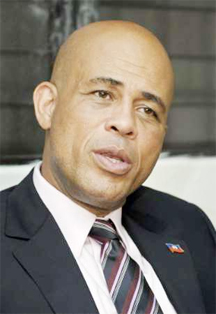PORT-AU-PRINCE, (Reuters) – Haitian President Michel Martelly yesterday launched a plan to restore the nation’s armed forces, despite fears their revival could be divisive in a country bloodied by past military coups and rights abuses.

In a ceremony marking a 19th-century independence battle, Martelly apologized to past victims of the Haitian army that was abolished in 1995 by former President Jean-Bertrand Aristide, himself once ousted in a 1991 military coup.
Martelly, a former pop star, said Haitians would prefer to have their country protected by its own army rather than by foreign troops who have acted as peacekeepers in the impoverished Caribbean nation since 1994.
“This has been going on for 17 years and that is 17 years too much … This should stop and it will stop,” he said, speaking in front of the presidential palace at an event attended by ministers, dignitaries and diplomats.
Martelly, elected in March on a nationalist platform pledging Haiti’s renewal after a devastating earthquake last year, announced the setting up of a civil commission to prepare a road map for restoration of the military.
After consultation with various national sectors, this plan would be presented on Jan. 1, independence day in what is the Western Hemisphere’s poorest state.
Martelly’s words drew applause from the crowd and shouts of “Long live the army!”
“A FULL VETTING
PROCESS”
But donors and rights activists say they fear the restoration of an institution accused of past abuses could be divisive and divert resources from more pressing challenges of rebuilding after the 2010 earthquake.
“Our main concern is about what function would this military play in Haiti and who will integrate it,” said Amnesty International’s researcher on Haiti, Gerardo Ducos, adding it was expected former military officers would rejoin.
“We know the army in the past was involved in repression … . We need a full vetting process,” he told Reuters.
Public opinion has soured toward the more than 12,000-strong foreign U.N. peacekeeping force in Haiti. Its image has been badly tarnished by recent allegations of sexual assault and accusations that Nepalese U.N. troops brought a deadly cholera outbreak to the country. More than 6,700 Haitians have died from cholera since last year.
“We’ve had enough of the foreign soldiers that brought cholera here, causing thousands of Haitians to die … . That’s why we need our army to replace them,” said Lochard Jeremie, 25, a student whose father was an army surgeon.





